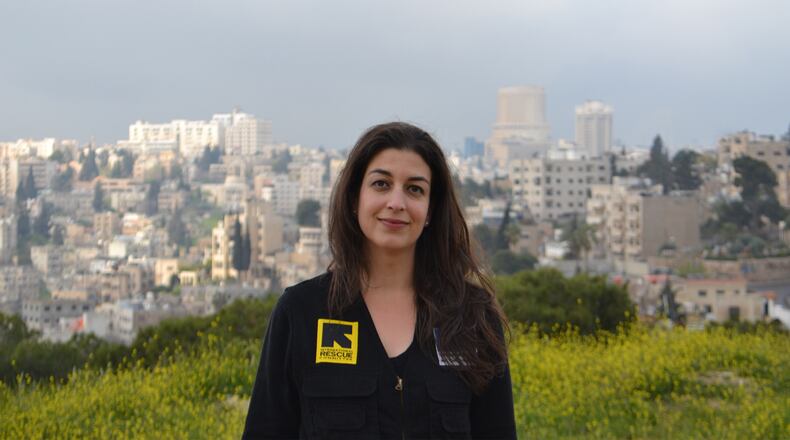The blank expressions on the Syrian refugee children’s faces have stayed with Bill Hampton.
It was almost as if the kids were looking through the Catholic deacon from Peachtree City as he volunteered to feed and clothe them in Europe this year. He wondered whether they had seen and done too much during the 5-year-old civil war that has killed hundreds of thousands of their countrymen and displaced millions of others.
“I was amazed at how many young kids there were,” the retired Keebler Co. executive said of the eight days he spent volunteering with Catholic Relief Services in Athens, Greece, and Belgrade, Serbia, in January. “Many of these kids had not been in school for two years, three years, four years, five years.”
Hampton is among a growing number of Georgians traveling overseas to serve on the front lines of the refugee crisis. The Georgians — who include another Catholic deacon from Newnan, a humanitarian worker from Johns Creek and many members of a prominent Marietta Baptist church — are getting an up-close view of the plight amid the national debate over whether to welcome more Syrian refugees to the U.S.
President Barack Obama has said the U.S. will accept 10,000 in the coming months. But recent terrorist attacks in Paris, San Bernardino and Brussels have given rise to security concerns. The reason: the Islamic State, a terrorist group with a stronghold in Syria, has claimed its followers carried out all three massacres. And that has prompted some concern that Islamic State terrorists could infiltrate the refugee resettlement process here.
Republican presidential front-runner Donald Trump has proposed barring Muslims from entering the United States. In November, Georgia Gov. Nathan Deal joined two dozen of the nation's governors in moving to block Syrian refugees from resettling in their states. Deal reversed course in January after receiving a legal opinion that says he can't stop them from coming. Thirty-five Syrian refugees have arrived in the Peach State since Nov. 26.
Hampton and the other Georgians who have traveled overseas said what they witnessed contradicts much of what they have heard in the contentious debate about the refugees. Most of the Syrians they encountered were traveling as part of families, including small children. Many were middle-class or affluent and well-educated people who would return to their homeland, if peace takes hold. Further, they are required to endure a rigorous, years-long security screening process — including submitting to interviews and fingerprinting — before they can resettle in the U.S.
Hampton traveled to Europe with fellow Catholic deacon Steve Swope of Newnan through Catholic Relief Services’ Global Fellows program. They were there to help the refugees as they disembarked from ferries. Many are making perilous journeys from Turkey on small rafts and boats to Greece. The Georgians were there on the docks, greeting them as they arrived on ferries from Greek islands. They handed out hats, coats and blankets, and diapers for their children.
Swope remembers meeting one Syrian man who was traveling with his wife and three children. The man had two graduate degrees in engineering, spoke four languages and taught at a university before the war destroyed his home and forced him to flee with his family to Europe.
“They are just like us,” Swope, a retired business owner, said of the refugees he met. “There is not a person I met during my trip that I would not let spend a night in my house — and have them over to my house for dinner. These are just our fellow human beings.”
Colette Le Jeune of Johns Creek is working in Jordan for the International Rescue Committee, a major refugee resettlement organization that is helping relocate Syrians to Georgia. As an advocacy coordinator in Amman, she is researching the difficult conditions Syrians are facing and finding ways to help them. Like Swope and Hampton, she recognizes misconceptions about the Syrians.
“They were living normal lives. And their lives have just been torn apart and totally shaken,” she said in an interview from Amman over Skype. “The majority of the people on these boats that are risking their lives are women and children. … And they don’t have a connection to illicit behavior or terrorism, or pose a real security risk.”
Bill Cleaver is helping coordinate trips to refugee camps in Lebanon for himself and fellow members of Johnson Ferry Baptist Church in Marietta. A church deacon who works at a major snack company, Cleaver has traveled to Lebanon many times in recent years to help with relief efforts. Two more trips are planned for this year. His church's pastor, Bryant Wright, visited camps for displaced Syrians on the borders of Jordan and Lebanon in 2014 and supports Johnson Ferry's work there. Further, fellow church members are now helping Syrian refugees resettle in the Atlanta area.
Cleaver has found the overseas relief work simultaneously rewarding and bittersweet.
“All the needs cannot be met because they are so great and there are so many,” he said. “It gives you a bewilderment — or a heartache — about not being able to do more.”
About the Author
Keep Reading
The Latest
Featured



